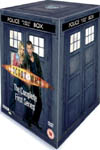DVD Extras (box sets only) include:
Something about the dialogue he gives the Doctor and Rose specifically when they banter amongst themselves, and later with Jack Harkness, doesn't quite gel though. Perhaps it is the way it's directed: they hop and skip through it too quickly, and touch on too many unrelated subjects without getting into them properly. Add to that their British idioms and colourful accents, and I find myself rewinding all too often to try to catch up with them, only to realize how unimportant the lost dialogue was MOST of the time. Better to cut those passages altogether, than rush them to squeeze it into the episode timing. Sometimes less is more.
The TARDIS interior gets its due in this story, but there is but one on-screen materialization for the police box. It seems to be becoming a fad to do this in a motion shot now, and sadly this is probably the most disappointing one yet. We miss half the effect waiting for the camera to pan down. It's almost as bad as the non-materialization of "The Talons of Weng-Chiang" (story no. 91), where the tilting camera missed the entire effect (much to the relief of the effects crew, no doubt). Once one makes one's peace with the setting we are stuck with though, Moffat masterfully layers in element after element, just as needed to craft a great story, and pulls the viewer in magnetically. Great stuff. The cast begins with just the Doctor and Rose, and basically only grows when someone we already know meets someone new. Excellent. And if you think you know what Doctor Who stories are all about, guess again. This story is full of puzzlers, to keep you wondering what things mean, and what holds it all together. It's suspenseful, eerie, and humorous all in one. The complete package. Moffat also does a great job of leading us through each setting in the story, and building anticipation of future ones. Christopher Eccleston is excellent in this story, possibly at his very best ever as the Doctor. Richard Wilson also gives an exceptionally enjoyable performance as Dr. Constantine, despite having a relatively small amount of screen time. John Barrowman's Jack Harkness is about 90-95% good stuff, but manages to project that icky, insincere aura that there's a lack of substance to his style in there somewhere. Thankfully this works for his character in general, if only it wouldn't pop up in moments when, as far as we know in retrospect, he is supposed to have more heart. Moffat enticingly keeps his audience in suspense as to the real premise of his story until the very end, at which point the motivations and mechanisms of that premise might be a bit much to believe in. What really strains credulity is the nano-genes' flip-flop, from incredibly ignorant and aggressive, to suddenly intelligent and helpful. Also, in the old days, the Doctor would patch into new technologies with wires to add his influence. I'm okay with the writers coming up with new ways of him doing that, but such mechanisms should be more clearly defined. Is he meditating new ideas into them directly from his brain? Is it important to touch them during this process? Or is psychology meant to be the main mechanism through which the Doctor triggers the resolution? This is perhaps a bit of a dangerous road to travel on, because it limits him to being the mentor, while Nancy becomes the hero / main protagonist. This dynamic can work as an exception in Doctor Who, but during season 27 it has really become the rule. So far, this is the only story other than "The End of the World" (story no. 162) to give the Doctor the heroic final fix of the story... if indeed he actually has it. Too bad the case wasn't more clear cut. Also, the idea that a genetic alteration would show up in a person's physiology as quickly as the morphing effects shots indicate is another huge stretch. A secondary mechanism that carries out the nano-genes' desire for as rapid a healing as possible needs to be defined as well. Though the third quarter of the story seems to lag a bit, and the final explanations strain beliefs somewhat, there is a very good energy to the end of this story. It can also join the very elite few Doctor Who stories in which no one dies, and by God it's not letting the audience miss that distinction for a minute. It's most grandly celebrated. Nice job.
International Titles:Deutsch: "Das leere Kind"
Magyar:
Français:
Русский: "Пустой ребёнок"
Italiano: "Il bambino vuoto"
This story has become available on DVD:
Note: The 13-episode box sets contain commentaries, behind-the-scenes featurettes, and other extras. The 4-episode volume only features the plain episodes. Comments on this article are welcome. You may contact the author from this page:
|








